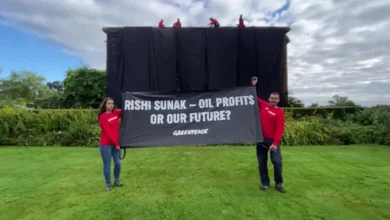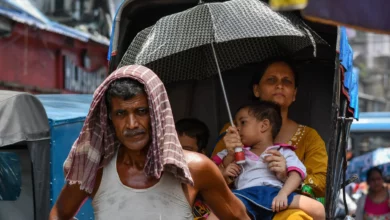Copenhagen–This city has been overtaken by some 34,000 delegates representing government and non-government actors as they come together to debate the future of global climate change during the two-week-long United Nations Climate Change Conference to debate the future of global climate change. These policymakers are also being joined by activists and protesters, though they are sometimes on the margins.
Negotiators hope to reach an agreement that can be sealed by the end of this week when heads of state from around the world arrive for the 15th Conference of the Parties (COP15) to the United Nations Framework Convention on Climate Change (UNFCCC) in Copenhagen. The COP is the governing body of the UNFCCC and will oversee the implementation of the Kyoto Protocol, or any other agreement that will come into force, through periodic meetings. At the heart of persistent challenges to a potential deal, are issues of mitigation, adaptation and financing. These are also the source of conflict between developed and developing nations.
An official state delegation from Egypt was dispatched to Copenhagen, mainly representing government bodies. However, environmental activists from non-governmental organizations were also seen around the venue of the event. They lobbied state delegations, organizing awareness and advocacy actions amidst the deliberations and closely followed developments in the negotiations.
Merit al-Sayed is an Egyptian banker who participated in the World Wide Views on Global Warming last September. The event, held simultaneously in various cities, was initiated by the Danish Board of Technology to be a global event for citizens to communicate their views on climate change and submit recommendations to the COP15. Al-Sayed participated in the Cairo event, organized by CARE. She came to Copenhagen to represent the citizens’ debate that took place in Egypt.
“I believe in the cause very much and I feel responsible as a citizen,” she said, following her talk at the COP15. “It is good that the UN has created space to hear the voices of the people and their take on what will hopefully be a binding treaty.”
“More than 100 people took part in the debate in Egypt, which we represent here today,” said Samir Sedky, agriculture and natural resources program manager with CARE Egypt. “Citizens have agreed that Egypt should reduce its carbon emissions although we’re not an industrial country, which shows the Egyptian commitment to make the world cleaner. We also focused on a rights and responsibilities approach in the debate,” said Sedky.
Rights discussed by Egyptians include access to low-cost renewable energy technologies, support for research and development in managing local resources like solar and wind energy, the reduction of global desalination cost, and fair trade agreements that support farmers’ move to sustainable agriculture. Responsibilities include citizen initiatives like tree cultivation, but also government pledges to fund cleaner industries and raise awareness about the environment.
IndyACT is another non-governmental player in Copenhagen through which Egyptian activists could play a role in the COP15. The organization, dubbed The League of Independent Activists, is a collective of international environmental activists that started in Lebanon, following the 2006 Israeli-waged war. Activists focused on oil spills in the Mediterranean Sea after the Israeli army bombed the Jiyeh power plant in southern Lebanon. The initiative grew to become an international environmental and social movement based on individual activists, rather than a central organization, calling for change on many fronts. One of those fronts is climate change and that was their mission in Copenhagen.
Lama el-Hatow is an Egyptian environmental activist and member of the policy team of IndyACT. In lobbying state delegations, el-Hatow focuses on both the Egyptian condition and the global need for commitments on climate change. "Egypt is one of the most vulnerable countries when it comes to the Arab world and in terms of the impact of climate change on the Nile Delta region and the Nile River flows. We’re talking about water scarcity, food insecurity and other catastrophic effects, such as the possible migration of 20 million people from the Delta region because of flooding."
“Egypt was vocal in calling for the 40 percent carbon reduction by developed countries in the proposal submitted by the League of Arab States last month,” she says. At the COP15, the European Union pledged to reduce carbon emissions by 30 percent by 2020 if it considers other developed countries’ commitments sufficient. The EU has already pledged to reduce emissions by 20 percent.
Other mitigation issues include keeping global temperature rise below 1.5°C, a demand expressed by many states that call for tougher climate goals, while other states will only settle for 2°C as a target. “Other Arab countries, such as oil producers, are reluctant to embrace those measures because they are afraid it could backfire in the form of carbon taxation for example,” el-Hatow says. Carbon taxation is a financial mechanism potentially being discussed during the Copenhagen negotiations, whereby states pay a tax if they exceed a set limit of carbon emissions. Many oil-producing countries in the Gulf reject the measure.
Besides lobbying for the most ideal terms in a potential climate change agreement, environmental activists are also undertaking awareness and advocacy projects. Sara Rifaat, an Egyptian activist with IndyACT, is involved with youth action during COP15, that involves using her skills as a graphic designer to organize innovative campaigns.
“We created a Maldivian passport and we will print it out and give it to delegates. We basically want everyone to follow the Maldivian model,” she says. Earlier this year, Mohamed Nasheed, president of the Maldives pledged that the Indian Ocean islands will become the world’s first carbon-neutral country by 2020. Nasheed made the pledge on behalf of his country, which is at risk of disappearing if sea levels continue to rise. Nasheed hopes to prompt similar initiatives from equally vulnerable developing countries.
In another action, Rifaat and her colleagues had one activist perform the role of an oil-rich country delegate. He stood in the middle of the conference center with a sign reading, “recruiting email hackers.” Two months ago, email hackers attacked hundreds of emails sent by climate change scientists in an American climate research unit. Some of the emails were leaked to bloggers and journalists and used by climate change skeptics who argue that climate data has been manipulated and climate change is not an imminent issue.
The Saudi Arabian delegation at COP15 used the incident to compromise its commitment toward climate change. "We wanted to create an action that lures people to think more," Rifaat says. "We sensed some presence of climate change skeptics in the conference and they were lobbying against state commitments to reduce carbon emissions." The performer inscribed the number 850 on his tie, mocking the generally agreed upon carbon emissions reduction by 350 parts-per-million in the atmosphere to avoid a climate tipping point.
Rifaat has been leading actions in Egypt as well. “I have strong interests in environmental issues from a long time. I got recently introduced to global actions and happy to be part of them. It’s also a good opportunity for an Arab youth presence in the COP15.”
IndyACT, alongside 400 other international and non-governmental organizations, set up a demonstration on 12 December in which a few thousand protesters marched from Copenhagen’s downtown to the conference venue. Protesters marched with signs reading slogans that included “Seal the deal,” “It’s planet, not profit,” “Time for climate justice,” “There is no planet B,” among others. They wore costumes, put on make-up and carried props, including a replica of the Statue of Liberty with a torch that emit smoke instead of the famous flame of liberty.
But among the many voices, one main statement was clear: We need world leaders to deliver a real climate deal in Copenhagen.




